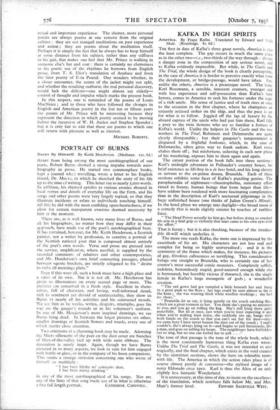KAFKA IN HIGH SPIRITS
America. By Franz Kafka'. Translated by Edward and Will_ Muir. (Routledge. 8s. 6d.) THE first in date of Kafka's three great novels, America is the least complete. The gap occurs in much the same place as in the other two—i.e., two-thirds of the way through : always a danger zone in the composition of any serious novel, and to Kafka evidently impassible. But while, in The Castle and The Trial, the whole design of the book is clearly perceptible, in the case of America it is harder to perceive exactly what form the development, or bridge-passage, would have taken. For, unlike the others, America is a picaresque novel. The hero, Karl Rossmann, a sensible, innocent creature, younger and with less experience and self-possession than Kafka's later heroes, comes to America to seek his fortunes under the aegis of a rich uncle. His sense of justice and of truth rises at once to the occasion in the first chapter, where he champions an unjustly accused stoker on the- ship, and thus the pace is set for what is to foljoyi. Joggled off the lap, of, luxury by the absurd caprice of the uncle who had put him there, Karl falls a prey to the twin demons who are so familiar a feature of Kafka's world. Unlike the helpers in The Castle and the two workers in The Trial, Robinson and Delamarche are quite clearly disreputable ; but their gangster's temperament is disguised by a frightful bonhomie, which, in the case of Delamarche, often gives way to frank sadism. Karl twice shakes them off; but misfortune, ushering in each new phase of his wandering, exposes him to them again and again. The extant portion of the book -falls into three sections : Karl's midnight adventure in Pollunder's country house, his brief existence as lift-boy in a de luxe hotel, and his long slavery as servant to the ex-prima donna, Brunelda. Each of these sections exhibits some facet of Kafica's puzzling genius. The paraphernalia of nightmare—claustrophobia, stationary effort raised to frenzy, human beings that loom larger than life— have seldom been rendered with more fascinating completeness than in the description of Karl's nocturnal pilgrimage in the huge unfinished house (one thinks of Julien Green's Minuit). In the hotel phase we emerge into daylight—the broad noon of a' comedy that is made slightly sinister by touches of ruthless
farce.
" The Head Porter actually let him go, but before doing so crushed his arm in a final grip so violently that tears came to his own eyes with
the effort." • •
That is funny ; but it is also shocking, because of the irreduc-
ible which underlies it.
The more one reads Kafka, the more one is impressed by the exactitude of his art. His characters are not less real and complex for being so highly universalised; and it is the symmetry of the frame which makes, for instance, his pictures of gay, frivolous callousness so terrifying. This consideration brings one straight to Brunelda, who is certainly one of her creator's most successful comic monsters. - Completely selfish, indolent, bottomlessly stupid, good-natured enough while she is humoured, but horribly vicious if thwarted, she is the single female in Kafka's large menagerie of gods ; a wonderful
creation.
" The red gown had got rumpled a little beneath her and hung in a great peak to the floor ; her legs could be seen almost as far as the knee ; she was wearing thick white woollen stockings ; she had no shoes."
" Brunelda, let us say, is lying quietly on the couch catching flies, which are a great torment to her. You think she's paying no attention to you,. and you go on rolling the keg. She's still lying there quite peacefully. But all at once, just when you're least expecting it and when you're making least noise, she suddenly sits up, bangs with both hands on the couch so that you can't see her for dust—since we came here I have never beaten the dust out of the couch ; I really couldn't, she's always lying on it—and begins to yell ferociously, like a man, and goes on yelling for hours. The neighbours have forbidden her to sing, but no one can forbid her to yell . . ." The tone of that passage is the tone of the whole book, which is the most consistently humorous thing Kafka ever wrote. Unlike The Trial and The - Castle, it was not intended to end tragically, and the 'final chapter, which exists in the void created by the unwritten sections, shows the hero on tolerable terms with life. The America in which the action takes place is of course almost purely de convention—the stylised image of a noisy Eldorado circa 1910. Karl is thus the Alice of an only slightly less fantastic Wonderland.
It is unnecessary, at this time of day, to insist on the excellence Of the frathrition; which novithere falls" belcivi" Mt. and Mrs.














































 Previous page
Previous page